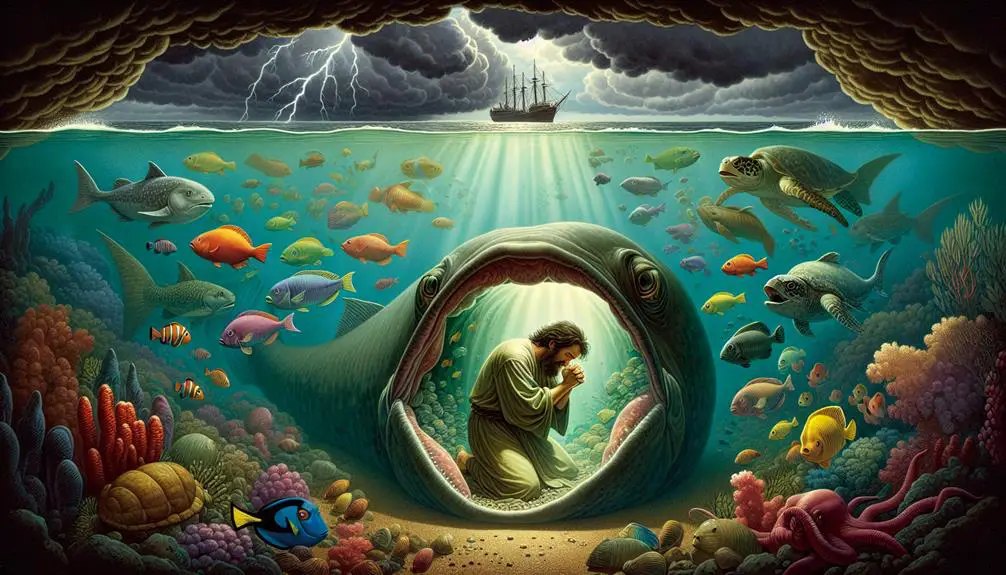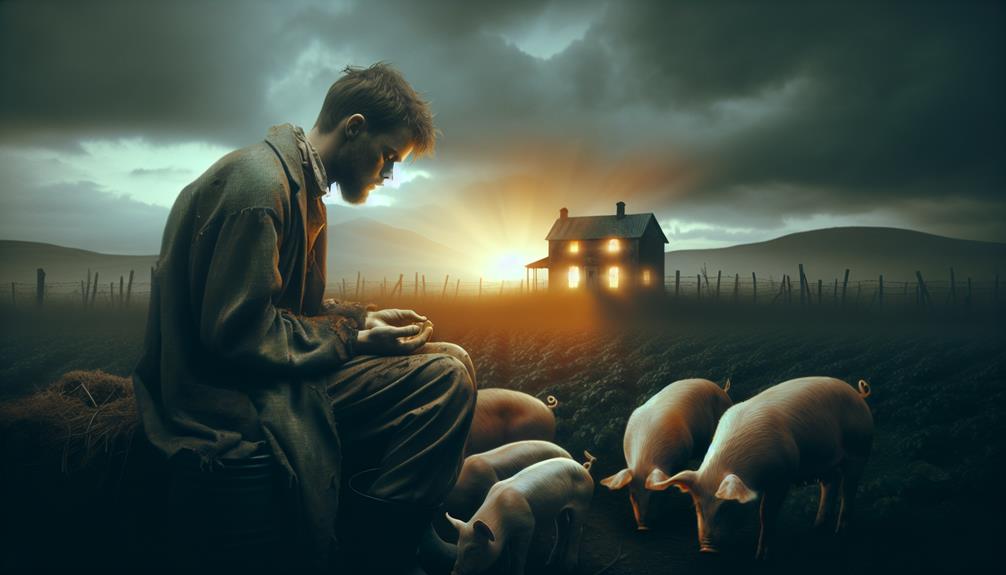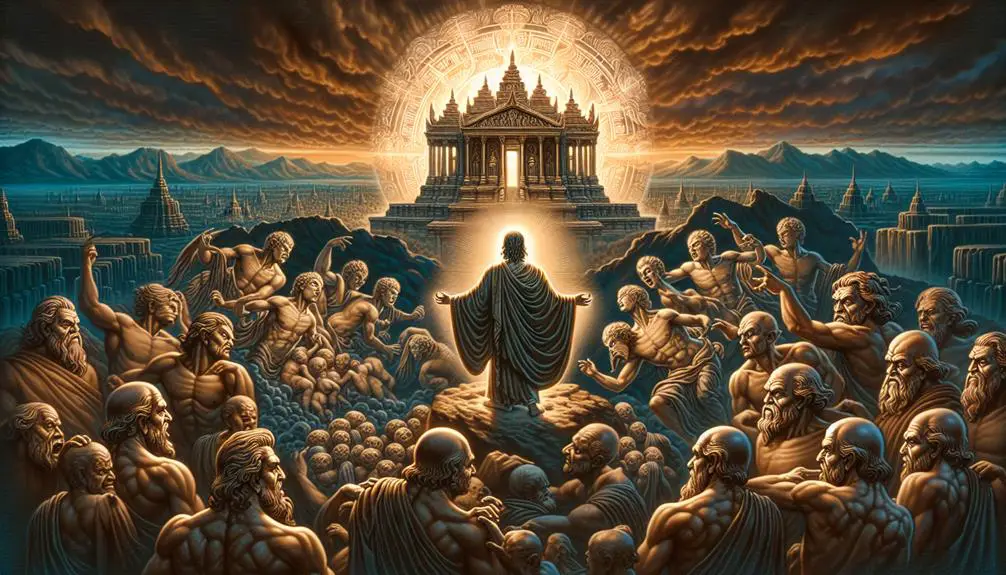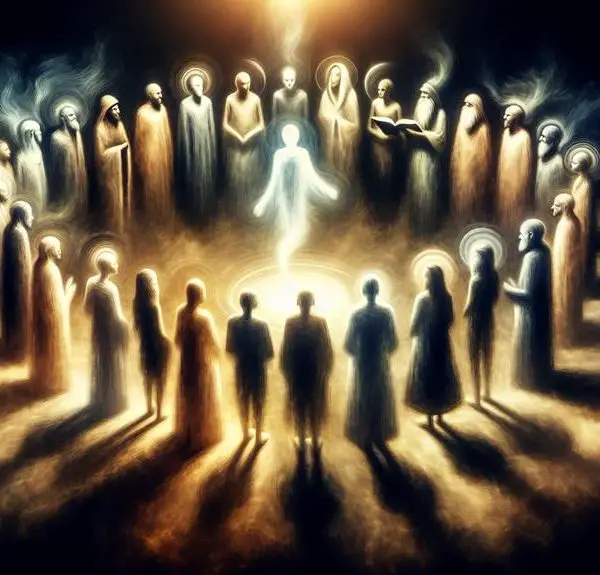Discover the complex tales of backsliders in the KJV Bible, and see what lessons their stories might unfold about faith and redemption…

Backsliders in the Bible Kjv
As they say, 'to err is human, to forgive divine,' and you'll find no shortage of human error among the backsliders in the Bible's KJV. From Jonah's flight from God's command to Peter's denial of Christ, these stories offer not just cautionary tales but deep insights into the nature of faith, repentance, and redemption.
You may find yourself surprised by the complexities of these biblical figures, whose journeys back to faith are fraught with challenges and personal failings. So, why not explore these narratives further to uncover the profound lessons they hold on human nature and divine grace?
Key Takeaways
- Biblical narratives highlight that even the faithful can backslide but also find redemption through repentance.
- Stories such as Jonah, King David, and Peter show that disobedience and denial can be transformed by divine mercy and forgiveness.
- The Prodigal Son parable emphasizes unconditional love and forgiveness, underscoring the power of repentance in restoring relationships.
- Solomon's journey warns of the dangers of straying from faith, illustrating that wisdom and success cannot shield one from spiritual downfall.
The Story of Jonah

The story of Jonah, encapsulating themes of disobedience, redemption, and divine mercy, serves as a profound illustration of the complexities inherent in human defiance against divine will. You're drawn into a narrative where a prophet's reluctance to follow God's command illuminates the broader human experience of wrestling with duties perceived as daunting or unjust. Jonah's initial refusal to preach repentance to Nineveh, a city notorious for its wickedness, underscores a deep-seated aversion to offering grace to those deemed unworthy. This reluctance mirrors a common human inclination to judge and exclude rather than extend compassion.
However, the narrative arc of Jonah doesn't merely dwell on defiance but delves into the transformative power of divine mercy, both towards Jonah and Nineveh. After Jonah's encounter with the great fish—a divine intervention marked by both judgment and mercy—his subsequent decision to obey God and travel to Nineveh signifies a pivotal moment of personal redemption. Your attention is then shifted towards Nineveh's repentance, an event that underscores the expansive reach of God's mercy. Despite their egregious sins, Nineveh's inhabitants respond to Jonah's warning with genuine contrition, illustrating that divine mercy isn't confined by human moral assessments but is boundlessly available to all willing to repent.
Through this narrative, you're invited to reflect on the essence of divine mercy as a force that not only forgives but actively seeks the restoration and redemption of the wayward. Jonah's story, therefore, serves as a compelling testament to the power of repentance and the boundless scope of divine compassion, even in the face of profound disobedience.
King David's Lapse

Reflecting on Jonah's narrative of redemption, we're now drawn to King David's lapse, a different yet equally illuminating exploration of human fallibility and divine grace in the face of profound moral failure. David's story, particularly his Bathsheba encounter, serves as a seminal example of moral backsliding within the scriptures. This incident not only exposes the complexity of human nature but also underscores the potential for repentance and restoration.
David, despite his covenantal relationship with God and his status as a man after God's own heart, succumbs to temptation, leading to adultery and, subsequently, the orchestration of Uriah's death. This sequence of actions marks a significant moral collapse, challenging our understanding of biblical heroes and their susceptibility to sin.
The analytical lens through which we view David's actions reveals an intricate interplay between power, temptation, and accountability. His initial attempt to conceal his sin underscores a universal human inclination towards self-preservation, even at the expense of ethical integrity. However, the narrative arc doesn't end with David's transgression.
The turning point in David's journey is his confrontation by the prophet Nathan, which catalyzes a profound personal reckoning. The repentance psalms, particularly Psalm 51, articulate David's remorse and plea for divine forgiveness. These psalms offer a profound insight into the process of spiritual restoration, emphasizing the necessity of contrition and the possibility of redemption.
David's lapse and subsequent return to grace emphasize the biblical motif of redemption, highlighting the enduring relevance of these narratives in understanding the dynamics of human sin and divine forgiveness.
Peter Denies Christ

Turning our attention to Peter's denial of Christ, we encounter another poignant example of human frailty juxtaposed against the backdrop of divine prophecy and redemption. This narrative unfolds in a moment of intense pressure and fear, illustrating a profound Fearful Response from one of Jesus' closest followers. Peter, who once boldly claimed he'd never abandon Jesus, found himself in the throes of fear, denying any association with Christ not once, but three times. This act of denial serves as a pivotal moment of human weakness, underlining the complexity of faith and loyalty under dire circumstances.
Analyzing Peter's denial, it's crucial to understand the context of his Fearful Response. The fear of association with a condemned man, possibly leading to his own persecution or death, underscores the very human instinct for self-preservation. Yet, this moment isn't the end of Peter's story but rather the commencement of his Repentance Journey. The profound sorrow and repentance that Peter experiences upon realizing his betrayal highlight a transformative process. This journey of repentance is emblematic of the grace and forgiveness available through faith, illustrating that despite profound failures, redemption is within reach.
Peter's story, thus, transcends a mere historical account, morphing into a narrative rich with lessons on the dynamics of fear, failure, and the redemptive power of repentance. It underscores the notion that even in moments of significant backsliding, the path to redemption and restoration remains open, illuminated by the promise of divine mercy and forgiveness.
The Prodigal Son

Delving into the narrative of the Prodigal Son, we encounter a profound exploration of repentance, forgiveness, and the unconditional love of a father. This parable, rich in its depiction of family dynamics, serves as a quintessential example of a backslider's repentance journey, ultimately highlighting the transformative power of grace within the familial context.
The story begins with the younger of two sons demanding his share of his father's estate, which he then squanders in reckless living. This act of defiance sets the stage for an in-depth analysis of the complexities inherent in family relationships and individual moral failings. As the son reaches the nadir of his descent—feeding pigs and yearning to eat their slop—he comes to a pivotal realization of his folly and decides to return to his father, prepared to beg for mercy and accept the lowest position in his household. This decision marks the turning point in his repentance journey, signifying a humbling of spirit and a desire to amend his ways.
What makes this narrative particularly compelling is the father's response. Instead of condemnation or rejection, the father welcomes his son back with open arms, celebrating his return with extravagant joy. This reaction not only underscores the depth of the father's love but also serves as a powerful metaphor for divine forgiveness, illustrating that repentance is met with grace, not retribution.
Through the lens of the Prodigal Son, we gain invaluable insights into the dynamics of repentance and forgiveness within the family. This parable encourages a deeper understanding of the unconditional love that underpins true familial bonds, offering hope for reconciliation and renewal amidst human imperfection.
Solomon's Idolatry

While the narrative of the Prodigal Son offers insights into personal repentance and familial forgiveness, the story of Solomon's idolatry presents a complex examination of a leader's spiritual downfall and its ramifications for an entire nation. Solomon, renowned for his wisdom, embarked on the ambitious project of Temple construction, establishing a physical representation of Israel's covenant with God. Yet, paradoxically, his actions diverged from the wisdom he's famed for, leading him down a path of idolatry.
Solomon's wisdom, initially perceived as divine insight, granted him unparalleled discernment and understanding. This wisdom influenced his governance, fostering peace and prosperity in Israel. However, as Solomon's reign progressed, his wisdom was compromised by his personal choices, particularly his marriages to foreign women who worshipped other gods. These relationships catalyzed his descent into idolatry, contradicting the very essence of the wisdom he once epitomized.
The Temple construction, a monumental achievement in Solomon's reign, symbolized Israel's dedication to God. Nevertheless, Solomon's subsequent idolatry cast a shadow over this spiritual landmark. His deviation from monotheism not only contradicted his earlier achievements but also set a precedent for the nation's spiritual decline. Solomon's actions underscore the dangers of compromising one's faith and principles, illustrating how even the wisest leaders can falter.
In analyzing Solomon's idolatry, it's imperative to recognize the duality of his legacy. His wisdom and the Temple's construction remain testaments to his profound impact on Israel. However, his spiritual backsliding serves as a cautionary tale, reminding you of the persistent vigilance required to uphold one's faith and values amidst prosperity and success.
Frequently Asked Questions
How Does the Concept of Free Will Play Into the Stories of Backsliding in the Bible Kjv?
In your exploration of how free will intertwines with backsliding narratives, you're delving into a complex Free Will Debate.
The stories you're investigating underscore decision autonomy, illustrating that individuals hold the power to choose their paths, even when those choices lead away from previously embraced beliefs or commitments.
This autonomy is central, highlighting that, despite divine influence, personal choice plays a pivotal role in the journeys of faith and deviation.
Are There Any Examples of Female Backsliders in the Bible KJV, and How Are Their Stories Portrayed Differently From Their Male Counterparts?
You're exploring the portrayal of female backsliders in the Bible, focusing on how their narratives differ due to gender roles.
Interestingly, the Bible features fewer female backsliders, and when it does, the narrative focus often emphasizes their relationships and societal roles, rather than personal failings.
This contrast sharply with male counterparts, where stories typically highlight direct disobedience or failure in leadership, reflecting broader societal views on gender roles within the biblical context.
How Do the Consequences of Backsliding in the Bible KJV Compare to the Concept of Forgiveness and Redemption?
In the Bible, backsliding is like walking against a strong wind; it's a struggle with divine punishment often on the horizon. Yet, the narrative doesn't end in despair.
The Bible intricately weaves the concept of forgiveness and redemption into the fabric of these tales, presenting eternal hope as a beacon for the lost. This balance highlights a divine leniency that tempers justice with mercy, demonstrating a complex interplay between human frailty and divine grace.
In What Ways Do the Stories of Backsliders in the Bible KJV Reflect the Cultural and Historical Context of the Times They Were Written?
You'll find that stories in the Bible reflect their times' cultural significance and historical accuracy. These narratives, woven with moral and ethical teachings, offer insights into the societal norms, beliefs, and values of ancient civilizations.
Analyzing them, you uncover how religious texts served as a mirror to the communities they originated from, highlighting the dynamic interaction between faith, culture, and history, and providing a scholarly perspective on their enduring relevance.
How Has the Interpretation of Backsliding and Repentance in the Bible KJV Evolved Over Time Within Different Christian Denominations?
You're looking into how denominational perspectives have influenced the evolutionary interpretation of backsliding and repentance in the Bible KJV.
Over time, each Christian denomination has developed unique views, reflecting broader theological and cultural shifts. These interpretations evolve, sometimes diverging significantly from historical understandings.
They're shaped by each denomination's doctrine, societal changes, and scholarly debates, offering a rich tapestry of thought on an age-old biblical concept.
Conclusion
So, you've seen the spiritual rollercoaster ride of biblical VIPs – Jonah's aquatic escape plan, David's rooftop peeping mishap, Peter's amnesia about his BFF, the prodigal's wild spring break, and Solomon's foray into divine polyamory.
It's clear, the Bible's not just a holy book; it's a treasure trove of divine face-palms and celestial “I told you so.”
Remember, next time you slip up, you're in pretty esteemed company. Just maybe try not to make it biblical.



Sign up